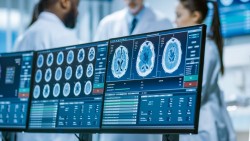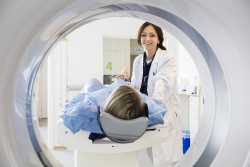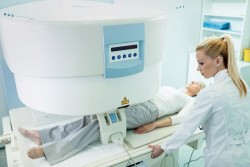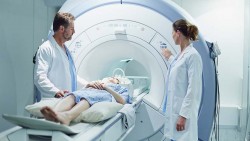What is an MRA?
A Magnetic Resonance Angiography (MRA) is a specific type of MRI that shows blood vessels and blood flow. MRA helps physicians plan the treatment of heart disorders, stroke, and blood vessel diseases.
How can I prepare for the exam?
- Eat a light meal. Most of our exams do not require fasting. However, if you need an abdomen (abdominal) exam, we ask that you fast for 3 hours prior.
- If your exam requires contrast material, we ask that you fast for 3 hours prior.
- Tell the clinician if you have any metal material, such as a pacemaker or implant, in or on your body.
- Remove all metallic belongings, such as jewelry or electronics, from your person before entering the room.
- Continue to take medication as directed by your doctor.
- Tell the clinician if you are breastfeeding or pregnant.
What should I expect during the exam?
You will be asked to lie on top of a table which is slowly moved into the tube-like opening of the magnet. The scanner is well-lit and permanently open on both ends. Earplugs and special headphones are available for your comfort.
Some exams use a contrast material, such as gadolinium or iodine, to increase the accuracy of the results. If required, you will be asked to drink a glass of oral contrast or receive an injection of intravenous (IV) contrast before you are scanned.
For a high-quality image, you will be required to remain still for the duration of the exam. The average exam lasts 30-60 minutes.
Do I need a creatinine blood test before my exam?
If your exam involves intravenous (IV) contrast materials, you may need a creatinine blood test beforehand. IV contrast materials are considered extremely safe. However, patients with poor kidney (renal) function may experience adverse side effects. Elevated serum creatinine levels indicate poor renal function.
For your well-being, we require creatinine blood test results from patients who:
- Are over the age of 60; or
- Have high blood pressure; or
- Have diabetes; or
- Have pre-existing kidney (renal) disease.
- Results must be less than 3 months old.
What if I have a fear of closed spaces?
If you have a fear of closed spaces, such as elevators, please ask your doctor about treatments and medications prior to your appointment. Most patients experience little to no discomfort during a closed MRI.
Although some imaging centers use an open MRI machine, we use a closed, high-field scanner which ensures clean, high-quality images. You can have peace of mind knowing you will receive an accurate, in-depth diagnosis.
Is an MRI exam safe?
Yes. MRIs have no known health hazards and does not use ionizing radiation.
Are contrast materials safe?
Yes. Patients rarely have allergic reactions to the contrast material. The contrast material will be eliminated by your body’s natural processes, so staying well-hydrated both before and after your exam is recommended. If you are a nursing mother, however, please wait 24 hours before breastfeeding.
Further questions?
We want to help guide you through every step of the process, so if you have any further questions or concerns about your exam, please feel free to contact us at (702) 550-2748.
Schedule





